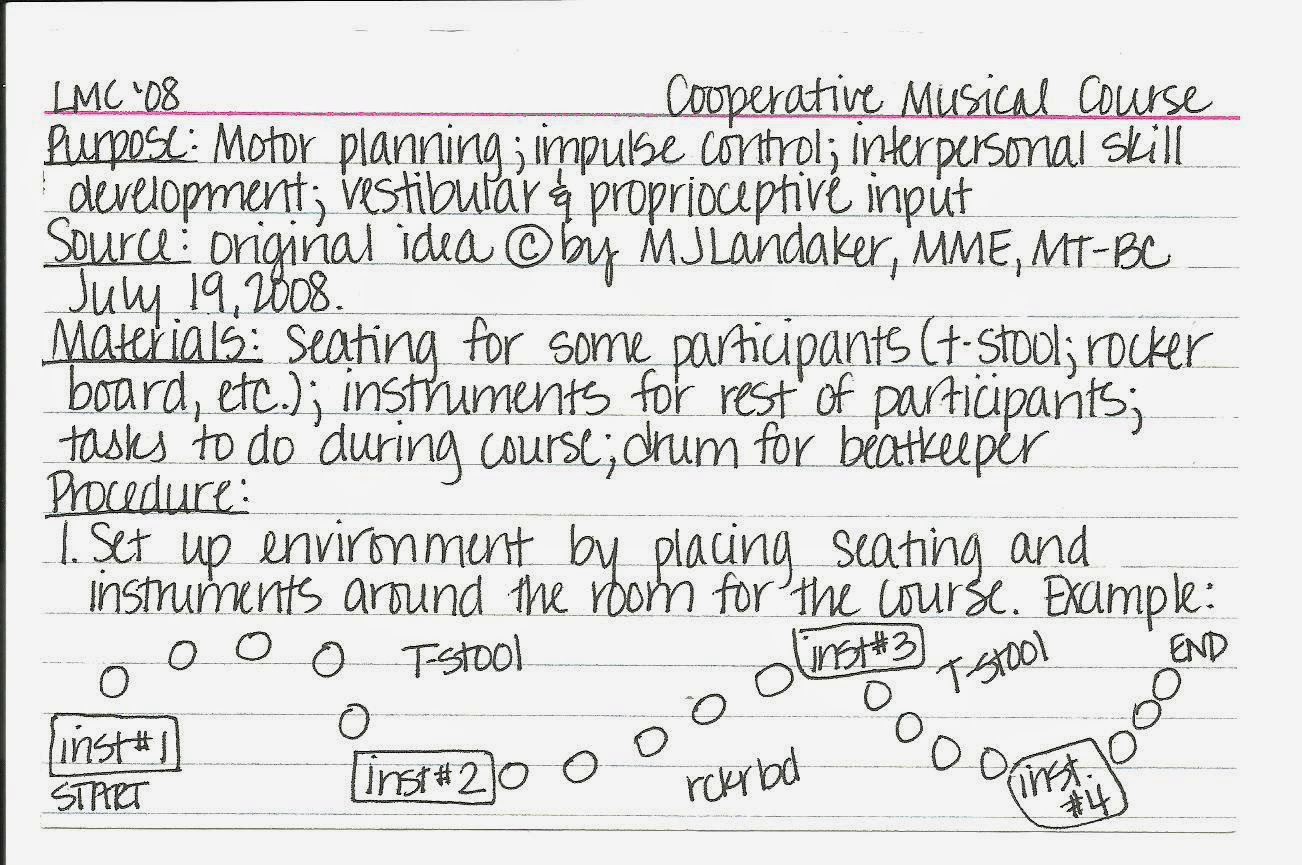TME Tuesday - Cooperative Music Course
I am a big fan of cooperation, especially when it comes to my students. Many of them do not have good frustration tolerance, so competition tends to make them unnecessarily cranky and to lose sight of the purpose of playing a game. Almost all of the games that I use in my music therapy clinic are cooperative between clients. They have to work together in order to "win."
This therapeutic music experience (TME) focuses on motor planning, impulse control, interpersonal skill development, motor entrainment to external beat, and vestibular and proprioceptive sense integration. I like to mix up the seating options including my T-stools, rocker boards, and bean bag chairs to increase the sensory stimulation. I also mix up the instruments so my clients can play the piano, the electric guitar, an Orff instrument or two, and various hand-held rhythm instruments. They progress in a round robin pattern so everyone gets to play everything at least once. This works really well for my clients that have short impulse durations. It's a bit more difficult for the clients who need time to engage, but they get the idea and seem to do better with transitions as the experience continues. This is often a requested TME and clients often remain engaged in the experience for 40-50 minutes without showing signs or symptoms of boredom.
There are two ways of going through this course - one at a time (which I find VERY difficult since there are lots of clients just sitting there watching) and everyone moving all the time (I like that better since it keeps all of my clients engaged all of the time). We use the drum beat to arrange our movement around the room. Clients step on a spot with every beat - tempi vary during the TME. We can also keep the drum beat going during our improvisation on the various instruments.
One more adaptation - I have used this format to arrange a class-wide blues experience. Prior to the TME, I use my Super Sticky Post-It notes to identify the note locations for a blues riff on my keyboards, the guitars, and other melodic instruments. I also include a microphone as one of the stations so we can all experience the blues. My clients move around the instruments, playing the basic blues riff while their classmate sings - either improvised or guided by me. Each person gets a verse. I love recording these pieces.
So, I have used this format and TME with all of my clients - folks with multiple disabilities, mild disabilities, and all of my clients in between.
This therapeutic music experience (TME) focuses on motor planning, impulse control, interpersonal skill development, motor entrainment to external beat, and vestibular and proprioceptive sense integration. I like to mix up the seating options including my T-stools, rocker boards, and bean bag chairs to increase the sensory stimulation. I also mix up the instruments so my clients can play the piano, the electric guitar, an Orff instrument or two, and various hand-held rhythm instruments. They progress in a round robin pattern so everyone gets to play everything at least once. This works really well for my clients that have short impulse durations. It's a bit more difficult for the clients who need time to engage, but they get the idea and seem to do better with transitions as the experience continues. This is often a requested TME and clients often remain engaged in the experience for 40-50 minutes without showing signs or symptoms of boredom.
There are two ways of going through this course - one at a time (which I find VERY difficult since there are lots of clients just sitting there watching) and everyone moving all the time (I like that better since it keeps all of my clients engaged all of the time). We use the drum beat to arrange our movement around the room. Clients step on a spot with every beat - tempi vary during the TME. We can also keep the drum beat going during our improvisation on the various instruments.
One more adaptation - I have used this format to arrange a class-wide blues experience. Prior to the TME, I use my Super Sticky Post-It notes to identify the note locations for a blues riff on my keyboards, the guitars, and other melodic instruments. I also include a microphone as one of the stations so we can all experience the blues. My clients move around the instruments, playing the basic blues riff while their classmate sings - either improvised or guided by me. Each person gets a verse. I love recording these pieces.
So, I have used this format and TME with all of my clients - folks with multiple disabilities, mild disabilities, and all of my clients in between.



Comments
Post a Comment